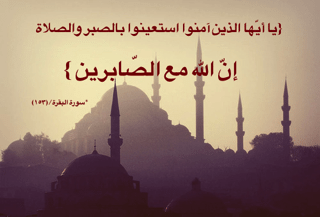Qur’an Reflections: Day Two: Baqara [2.142-252] – Remembrance, Patience, Love, Thankfulness, Mindfulness, and Closeness
In this series, Shaykh Faraz Rabbani and Ustadh Tabraze Azam, SeekersHub Global Instructors, share a day by day overview of key themes of each section (juz’) of the Qur’an, over the month of Ramadan. This is covered nightly at IMO of Toronto, where SeekersHub Toronto (www.seekers.flywheelstaging.com) is conducting its Ramadan 2013 programming.
Day Two: Juz’ Two: Surat al-Baqara [2.142-252]
This Part (juz’) of the Qur’an contains some of the central spiritual principles of our religion. Five key concepts that are highlighted are:

1. Remembrance of Allah out of Thankfulness
“…We have sent among you a Messenger of your own to recite Our revelations to you, purify you and teach you the Scripture, wisdom, and things you did not know.” [Qur’an, 2.151]We are reminded of the tremendous gift of the Prophet (Allah bless him and give him peace), the gift of mercy:
Right after, we are called to remember Allah–the Bestower of Gifts–and to be thankful to Him:
“So remember Me; I will remember you. Be thankful to Me, and never ungrateful.” [Qur’an, 2.152]
2. Patience in Trials
Trials are a hidden blessing from Allah, as they are a means of responding right–through patience, contentment, and right action, in pursuit of Allah’s pleasure:

“Believers! Seek help through patience and prayer, for Allah is with the steadfast.” [Qur’an, 2.153]
What is patience? Patience (sabr) is to remain firm on what is pleasing to Allah. It is to leave complaint and objection; to embrace contentment, inwardly, and to respond to all situations in ways pleasing to Allah.
Patience isn’t being passive: patience is strength, light, and a means to closeness to Allah:
“We shall certainly test you with fear and hunger, and loss of property, lives, and crops. But give glad tidings to the patient.”[Qur’an, 2.155]
3. Intense Love of Allah
Those who believe are more intense in their love of Allah. What is love? Love is constantly inclining towards the Beloved, with a heart overwhelmed with yearning, and limbs busy with acts of turning.
Love is desperate need for the Beloved.
Love is intense yearning expressed in one’s life, attitude, actions, and responses.
“There are some who choose to worship others besides Allah as rivals to Him, loving them with the love due to God, but the believers are more intense in their love for Allah.” [Qur’an, 2.165]
Nurture this love in your actions. Make them declarations of love for Allah. And strive to make your actions and states beloved to Allah by striving to emulate the Beloved Messenger of Allah (peace & blessings be upon him & his folk).

4. Fasting Seeking Allah’s Closeness, Out of Mindfulness (taqwa) and Thankfulness (shukr)
The ultimate purpose of fasting is attaining closeness to Allah (qurb):
“If My servants ask you about Me, I am indeed Near.”[Qur’an, 2.186]
The means to realizing this nearness (curb) of Allah are:
(1) mindfulness (taqwa), learned through living the lessons of restraint that fasting teaches:
“You who believe, fasting is prescribed for you, as it was prescribed for those before you, so that you may be mindful of God.”[Qur’an, 2.183]
(2) thankfulness (shukr) for all of Allah’s blessings. This begins with appreciating the blessings of food, drink and our desires, but extends to all of Allah’s blessings–the blessings of life itself, of faith, guidance, and all good in one’s life:
“… to glorify Him for having guided you, so that you may be thankful.” [Qur’an, 2.185]
Thankfulness is to recognize everything as being a blessing from Allah; to appreciate that blessing; and to express one’s appreciation in way befitting the blessing.
True thankfulness is to direct every blessing Allah has blessed you with towards the best of what is was created for–in seeking and beholding Allah the Bestower through His blessings.
Thankfulness is the state of the Messenger of Allah (peace and blessings be upon him), who said, “Should I not be a truly thankful servant?”
5. Asking Allah with Conviction and Neediness
It is from Allah’s Mercy that He has promised that He answers are supplication and calling:
“If My servants ask you about Me, I am near. I respond to those who call Me, so let them respond to Me, and believe in Me, so that they may be truly guided.”[Qur’an, 2.186]
Calling upon Allah is both with one’s supplication (dua) and all one’s actions. Our actions are a response to Allah’s call–and, if done seeking Him sincerely, a means to realizing the realities of Allah’s closeness.
And Allah alone gives success.
Faraz Rabbani and Tabraze Azam
SeekersGuidance / SeekersHub Global NEEDS your HELP: Help us reach seekers, across the world, through completely free Islamic courses, answers, and programs: https://seekers.flywheelstaging.com/donate/ — SeekersHub Global also accepts zakat donations, which are distributed to eligible seekers of knowledge.
